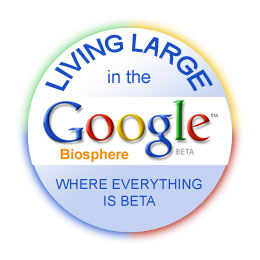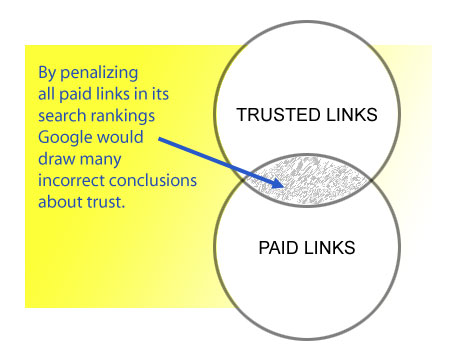Living in the Google Biosphere: The dreaded paid link
 A biosphere is a closed ecosystem, within which everything is interdependent. The Earth is probably the best example of a biosphere. An action in one part of the biosphere often creates completely unintended reactions.
A biosphere is a closed ecosystem, within which everything is interdependent. The Earth is probably the best example of a biosphere. An action in one part of the biosphere often creates completely unintended reactions.
The growth and development of the Internet makes a lot of sense when it is thought of as a biosphere. Sure it’s an atypical example of one, but it is rich in organic bio-material: raw, unfiltered humanity.
As its market share in search increases, Google is obtaining a more and more significant role in the biosphere. Their role has become so significant, it is almost as if they own it. More and more, they actually do.
Google has already transformed the Internet in astounding ways. Perhaps most significantly, they have enabled the mass commercialization of content by empowering small webmasters with the ability to buy and sell advertising in small chunks.
The result has been unbounded capitalism and the creation of a vibrant marketplace. Much of the rich content and resources would not exist on the Internet today if the masses were not able to participate monetarily.
Google has a problem with paid links
Matt Cutts, the head of Google’s web spam team has casually dropped a velvet threat:
As long as we’re talking about links, this seems like a pretty good opportunity to talk about a simple litmus test for paid links and how to tell if a paid link violates search engines’ quality guidelines. If you want to sell a link, you should at least provide machine-readable disclosure for paid links by making your link in a way that doesn’t affect search engines…. I’ve said as much many times before, but I wanted to give a heads-up because Google is going to be looking at paid links more closely in the future.
When Matt Cutts says that Google is going to be “looking at something closely” it isn’t idle chatter. Interestingly, as Graywolf astutely noted, a policy against paid links isn’t even in the Google Webmaster Guidelines. But it probably will be soon as Matt Cutts also wants you to report websites to Google that are selling links without annotating them as paid.
Why Google wants to turn us into link police
The magic of the Google algorithm that has laid so many golden eggs for them is that Google was the first search engine to find a way to incorporate significant social data. They interpret links as trustworthy. The theory goes that when someone links to something they are implicitly telling their visitors “I think this resource is relevant to you.”
Competing search engines, such as AltaVista relied mostly on “on-page” factors, such as the Meta Keyword tag. As these were easily manipulated, Google’s novel approach of using a crude social network disarmed the tactics of search engine spammers and leapfrogged them over the competition.
The problems with a reliance on links really began to show when Google launched their AdSense program. For the first time, anybody could create a page, get it ranked in the search engines and earn significant money from advertising to the traffic stream.
SEO went mainstream and tactics such as spamming blogs with comments to get backlinks took hold and began to impact Google’s search results.
It reminds me of an incident at Biosphere 2, an artificial ecosystem in Arizona where microbe-rich soil had been introduced to the biosphere to help grow plants but had the unintended consequence of the microbes consuming too much oxygen and near suffocating the inhabitants. Actions in the biosphere have reactions.
To prevent this, Google encouraged blog software manufactures and webmasters to encode comment links using “rel=nofollow” to indicate that these links are not from sources that the webmaster can vouch for:
“We encourage you to use the rel=”nofollow” attribute anywhere that users can add links by themselves, including within comments, trackbacks, and referrer lists.”
First they went after the spammers, now they’ve come for the advertisers…
Another threat has emerged to Google’s reliance on the trustworthiness of links – the dreaded paid link.
An important point to note is that paid links are often fundamentally different from links in comments, trackbacks and refer lists. In many cases, paid links are reviewed by the webmaster prior to inclusion. In other words, these are still trusted links in spite of a paid component.

Should Google in fact make it policy to imperil the rankings of websites that contain paid links, they risk misjudging the trustworthiness of the links and casting a lot of relevant content down into the bottom of the SERPs.
Is using links as a social metric flawed from the start?
There is no reliable way for search engines to reliably determine the extent to which a link is trustworthy. Google’s answer is to ask that webmasters encode them with rel=”nofollow”.
There are many problems with this but one significant one is that rel=”nofollow” has already been stigmatized to mean that the webmaster cannot stake his reputation on that link. This puts the webmaster in a lose/lose situation. He is asked to either brand links to trusted advertisers as untrusted or to risk losing significant traffic to his website.
Backroom link buying in Google’s Age of Prohibition
All this is really going to do is to drive link buying into virtual backroom speakeasies, as webmasters broker text links “off the grid” and away from Google’s prying spiders.
Does Google really want to play Big Brother here?
UPDATE: If you want to read more about this, check out the really great breakdown that Graywolf has put together here. Also, Scoble has a theory that this is targeted to take the wind out of PayPerPost. Colud be. Plus, Tony Hung essentially concurs and wonders if this is really Google’s Achilles Heel. Of course it is, and it will be until they can better integrate more telling social metrics into the algorithms and stick link analysis back a few rows where it belongs.
